

Mukti Participated in the Perspective Building Workshop
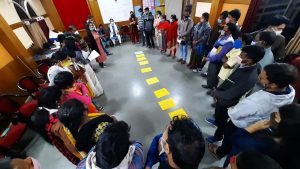
A Perspective Building Workshop was organized by “OAK Foundation” and “Praxis” in Puri, Orissa on December 20-21, where Mukti participated with other organizations like Indraprastha, DRCS and BTS. The objective of the workshop was to broaden the scope of knowledge of the organizations in listening to the problems of people from different walks of life and to take initiatives to solve them.
From Mukti’s end Ms. Amuna Mondal, Mr. Pinaki Naiya, Mr. Apurba Karan, Ms.Panchami Shit and Ms. Nandita Jayraman participated in the workshop.
On the first day, the participants were provided knowledge on the understanding of participation on the second day it was on gender and patriarchy, adolescence agency, community-center advocacy and sustainable livelihoods.
1st-day workshop
Participation
A)String Game:
The participants were introduced through a string game. While discussing this exercise, the members highlighted certain important understandings that they gathered through this participatory process- Collective action, Resource and strategizing, Responsibility and ownership.
B) Active Listening Exercise:
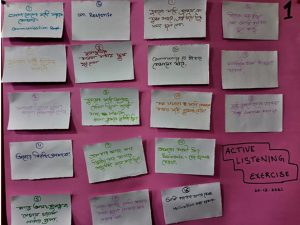
Diagram 1: Several points that came up after the discussion on Active Listening Exercise
The members were made to understand the importance of being an active listener when the other (field participants) is speaking through two exercises. The group also reflected:
Several Field issues, Relook at the field gaps experienced, Need for active participation, The Right process to participation, the need to motivate the field respondents when they become inattentive, engaging people in other means, Mutual understanding, Inclusion of everyone, Creation of a space to express each other’s identity, Curiosity to learn from each other, Supporting each other in both favorable as well as adverse situations, Eye to eye communication to avoid communication gaps, Body language, that is at par with the community, Good communication and Proper Planning.
C) Understanding Participation:
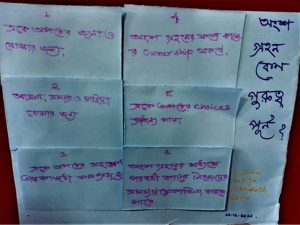
Diagram 2 (Above): Why is Participation important?
The importance of participation needs to be realized and therefore a group exercise was conducted, dividing the whole team into 8 groups and asking the groups to share their understanding on:
▪ What is participation?
▪ Why is participation important?
▪ What is not Participation?
▪ What are the barriers to participation?
The outcome of the exercise:
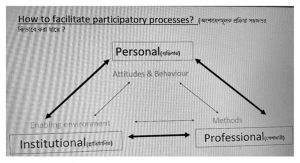
Diagram 3: PRA Pillars
Just knowing the tools does not make a Participatory Process but how the tools are used and implemented including everyone’s participation is called a Participatory Method. PRA is teamwork. PRA is not just tool but an approach.
Identifying the basic Participatory pillars is important, i.e. institution understanding, capacity building, the need to empower everyone, i.e. the last person (age, deprived, marginalized in respect to sex, gender, class, caste, religion) in the group, attitudes-behavior.
Valuing local knowledge, the field knowledge is important. They may have better knowledge about their area than the facilitator.
D) Power walk – Indicators And Intersectionality
Setting forward a few characters and assigning a few volunteers for those characters an exercise was conducted. Situations were narrated and each character was supposed to move forward if the situation announced matches with the character played or move backward if the situation doesn’t match the character.
After the exercise, it was really interesting to see how a big gap was created among the character’s positions. The position each character held made the picture clear of the several social hierarchies existing as well as the existing intersectionality that causes marginalization.
The several factors that came up to determine the disparity were:
Economic status, Power in the social hierarchy, Resource, Adhering to family norms, beliefs, and practices, Gender discrimination, Caste, Social status, Caste-based occupations, such as – Sanitation workers, dom, sweeper, sex worker (Dalit sex worker vis-à-vis generate caste sex workers), Legally banned occupations such as brewing liquor by Chharas in Gujarat, Race/ body features/ overall looks, Age-related decision-making power and control.
A diagram to build on the concept of intersectionality understandable:
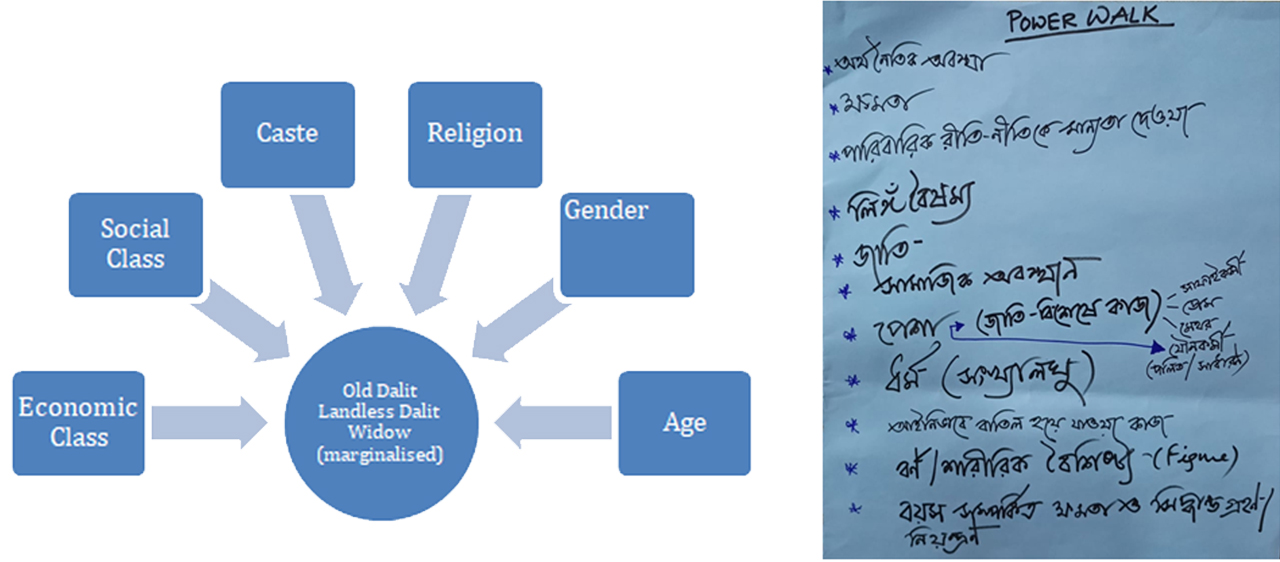
Diagram 4: Example of Intersectionality Diagram 5: Outcomes after the Power Walk Exercise
2nd-day workshop
2)Gender and Patriarchy:
Determining Sex/Gender:
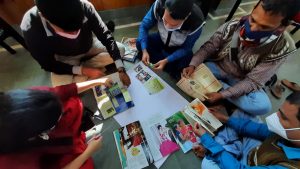
Participants are divided into small groups and given an exercise on gender determination, where the following indicators of gender differences from each individual group came up.
Physical appearance, Private vis-à-vis public space, Attire, Profession/ occupation, Quality, Usable products, Mobility freedom, Violence/ torture (in both private and public spaces), Differences in body features, Access to opportunities and Courage.
Characteristics of men and women were demonstrated in detail with examples and diagrams.
| MASCULINE | FEMININE |
| Coffee shop in a shopping mall | Roadside tea stall |
| Mother-in-law | Daughter-in-law |
| Teacher | Student |
| Parent | Child |
| Muscular man | Effeminate man |
| Heterosexual woman | Lesbian |
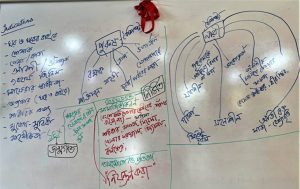
Diagram 6: Understanding Sex/Gender
3) Adolescent agency:
Through an experiential exercise, every member was asked to go back to their adolescent phase and then 8 groups were formed and each group was asked to discuss within themselves about a moment in individuals’ life when they were confused/scared/angry/sad. They were asked to talk about what emotions that experience was related to. Additionally, they were asked if they ever spoke about this with anyone and if not, what the reasons were.

This exercise made everyone think about Adolescent children in Sunderban, the situation the kids are facing around the Disaster Prone Area, especially the existing gender disparity, the social burden of being a girl child, and the adolescent girls not being able to make decisions.
The group realized that adolescents’ feelings need to be taken into priority. With:
- Creating spaces for adolescents – approach in dealing with adolescents.
- Storytelling exercise.
- Valuing local knowledge: Shifting perspective.

The diagram shows that before power was closed within the powerful individuals of the society, however with the implementation of PRA tools, there is a gradual shift in the power hold while interacting with the community, discussing, analyzing the community gets empowered and the power distribution takes place within the community through full-active participation, and finally, the power is held by everyone and it is the democracy of the ground(power held by common people) not clustered within a few people.
Thus, defining this agency:
Allowing everyone to speak, waiting patiently for the community’s answer instead of rushing to fulfill our agenda, effective questioning (by understanding the goals), establishing own opinion, having multiple choices, exercising rights, freedom to express opinions, presence of the person in the decisions taken for the same, responsibility, standing together in adverse situations, NGOs ‘not’ imposing their decisions on children.
Participation Ladder:
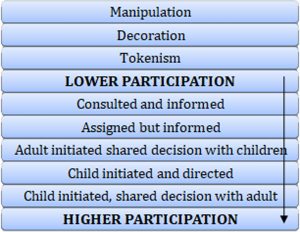
With the above understandings, this Participation Ladder further helped to understand the concept of power and define the Participation process with Adolescents. One-sided understanding, manipulation, and imposing knowledge and understanding over kids is lower participation whereas one moves higher towards participation as consultation, interaction and child-initiated decision starts becoming the priority of the process.
4) Community Center Advocacy:
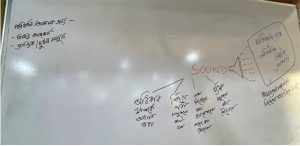
Diagram 12: Understanding Advocacy
▪ Informing people about their rights
▪ Raising voices for the powerless
▪ Reaching voices of those who are unable to speak up for their rights
▪ Bringing out the voices of the deprived and taking these forward to the influential/ powerful people (officials/ policymakers/ decision-makers)
▪ a political process
▪ a journey from being ‘people’ to ‘citizen’ and this journey needs a strategy/ a political process to form a policy and mitigate the unequal power hierarchy
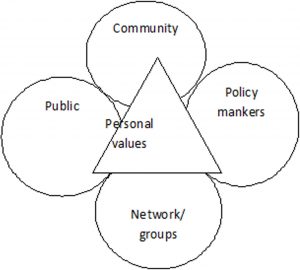
Diagram 13: People-centric Advocacy.
The community with influential people, people identifying the issues, common people like the middle class, media, decision-makers, writers, network/alliance-social justice, human rights, social institutions and legal institutions together create a voice of action that is People-centric advocacy.
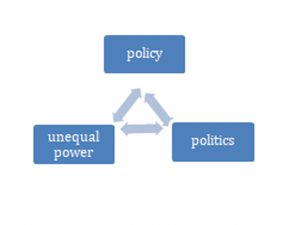
Diagram 14: Advocacy is interconnected; it needs politics- a strategy to mitigate the existing unequal power through forming a policy. And through this process, power will get distributed among the community- forming Democracy of the ground.
5) Sustainable Livelihoods:
Sustainable Livelihood means an economically viable, eco-friendly, and socially accepted work (for example, a thief’s work cannot be called a Sustainable livelihood) with ethical obligations.
Further, Chemical farming is not ethical and sustainable cultivation even if it is economically viable and therefore Chemical farming is also not a Sustainable Livelihood.
A diagram was shared for better understanding.
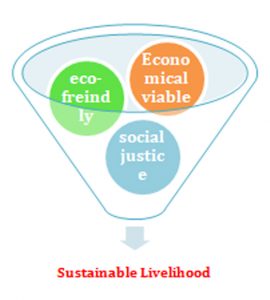
Diagram 15: Sustainable Livelihood.
A Sustainable Livelihood strategy was discussed where a poor family can utilize their assets, natural resources, existing infrastructure, existing government schemes, economic-social-cultural-political supports as well as taking into account the existing risks a family can produce, generate income as well consuming for themselves. The whole process is a cycle that needs every pillar to be actively participating.
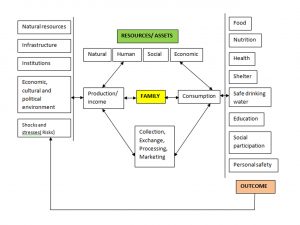
Diagram 16: Livelihood strategy
The Intervention Strategy for Sustainable Livelihood is- ecological diversity, increase in surface area, integrated farming system model, less risk because climate resistance, more production, more labor-intensive.
Priority:
The need is to work with the marginalized people through external support of the government and organizations with immediate government schemes, entitlements provisions, or providing livelihood protection.
6) Inclusion:
Revisiting micro-level plans from the above lenses and the lens of inclusion, evolving non-negotiable work from the organization’s end.
Segregating into 4 topics of discussion in the day workshop, the organizations involved in this workshop came out with a few non-negotiable agendas and they are:
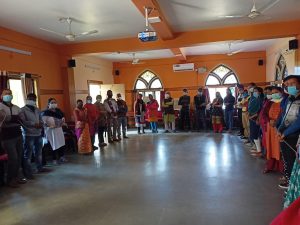
1) PARTICIPATION:
▪ Everyone should be participating, no one should be excluded or left out.
▪ Time, space, relationship needs to be taken into consideration and community participation should be a priority while deciding for the community.
▪ The priority will be reaching out to the marginalized, silenced, introverted and encouraging them for active participation.
▪ Those who have less confidence/silent/speak less/ differently-abled need to sit beside someone who can share their thoughts, or they should express their views in any form like visuals, expressing their thoughts through writings, etc.
▪ Trust building.
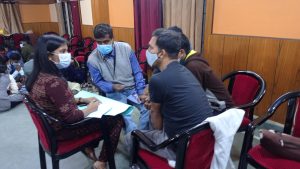
2) GENDER
▪ The need is to identify gender discrimination and speak about it.
▪ The need is to address every small issue so that they don’t magnify and develop into a worse condition.
▪ It is just not knowing, learning but the knowledge needs to reflect in the attitude and behaviour of the facilitator and the community people.
▪ Working for better and active involvement and participation in the community.
▪ “Fasciculation” should not be done by the facilitation.
▪ Male/Female binaries shouldn’t be considered as the only existing binaries to identify sexual discriminations.
▪ Nonconforming sexual identities should also be included.
▪ Not adhering to sexually discriminatory behaviors.
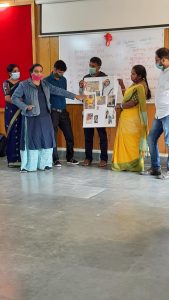
3) ADOLESCENT AGENCY:
▪ Their need is to prioritize and take into consideration that children’s opinion is important.
▪ Their age shouldn’t be a factor for not listening to them and the facilitator alone cannot decide for them.
▪ The Children’s voices need to be heard and their opinions need to be considered.
▪ When deciding for the children, the facilitator should include children, talk to them, participate and let them decide for themselves.
▪ Building and gaining the trust of children.
▪ Creating a safe space for children so that they can freely speak.
▪ Understanding the root cause of the problems.
▪ Create a space for perspective building.
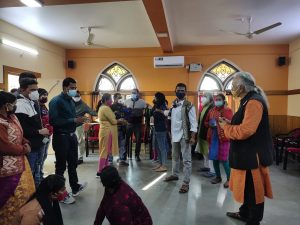
4) COMMUNITY-LED ADVOCACY
▪ Need assessment/issues identification needs to be done involving the community while working with the community.
▪ Planning a community active role with full participation and facilitator will be listening not imposing their understandings.
▪ Documenting the processes is necessary.
▪ For better participation of the community, the facilitator should be having a better relationship with the community, also solve their problems so that the community has full-active participation.
▪ Identifying the most marginalized individual/community in the village and supporting them, initiate and motivate them to voice their opinion.
▪ Identifying a Community Leader and their capacity building is necessary
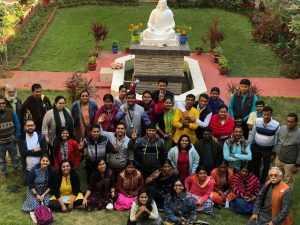
5) SUSTAINABLE LIVELIHOOD
▪ Economic security.
▪ Social security.
▪ Eco-friendly habitation.
▪ Identify the needs.
▪ Identifying/realizing the risks, barriers as well as estimating an individual’s assets.
▪ Optimum utilization of the existing assets.
▪ To understand and realize these above needs, A Need Assessment is required.
▪ As well as, identifying the economic level- the poverty level is important.
6) INCLUSION:
▪ The need is to listen, be attentive and regard the community and their voices as important.
▪ Do not impose the facilitator’s decision on the community.
▪ Create a safe, friendly environment for the community’s active participation and overall involvement.
▪ Keeping open-ended questions in the sessions.
▪ Sharing more case studies- real-life experiences so that community feels safe-motivated to voice their opinions.
▪ There should be different processes-ways to conduct a session.
▪ Changing the process of interacting, discussing, revisiting the issues, and providing several alternate ways for the participants to share their opinion by speaking, or drawing, or any mode of expression.
Project Activities
- A village for independent and enterprising women (A VIEW) (5)
- About Mukti (4)
- Accreditation (14)
- AGM (63)
- Agriculture Reforms (123)
- Ambulance Service (2)
- Amplifying Community Voices (67)
- Awards (15)
- Awareness and Empowerment (132)
- Awareness drives (56)
- Bio-Village-Kankandighi (10)
- Careers (14)
- Chick Rearing Programme for Marginalised Women (16)
- CHILD (18)
- Climate Resilience River Embankment (46)
- Covid-19 (74)
- Cultural Shows (7)
- Cyclone Aila (13)
- Cyclone Amphan (44)
- Cyclone Bulbul (30)
- Cyclone Dana (3)
- Cyclone Remal (12)
- Cyclone Response & Recovery (90)
- Cyclone Tolerant Houses (15)
- Cyclone Yaas (57)
- Disaster Recovery (264)
- Editorial (55)
- Editorial by Abir Biswas (1)
- Editorial by Amit Kumar Dey (2)
- Editorial by Ananya Chatterjee (3)
- Editorial by Ankita Kothiyal (3)
- Editorial by Debabrata Halder (1)
- Editorial by Dr. Alokananda Ghosh Sengupta (2)
- Editorial by Kasturi Bakshi (1)
- Editorial by Monami Mitra (1)
- Editorial by Nandita (3)
- Editorial by Pampa Karmakar (1)
- Editorial by Pranay Patra (1)
- Editorial by Prof. Pradeep Ray (1)
- Editorial by Ranitendranath Tagore (1)
- Editorial by Sankar Halder (14)
- Editorial by Satyajit Ray (7)
- Editorial by Sohini Mehta (1)
- Editorial by Sonamon Basu (3)
- Editorial by Soumitra Bose (2)
- Editorial by Subhankar Basu (1)
- Editorial by Supriyo Banerjee (3)
- Editorial by Ujjwal Maity (2)
- Education and Enrichment (409)
- Environment and Resilience (127)
- Featured Activities (24)
- Gram Clinic (9)
- Health Water & Sanitation (95)
- HOPE (10)
- Impact Stories List (109)
- Integrated Development (210)
- International Management Institute (IMI) (2)
- Jal hi Kal (6)
- Kitchen Gardening (16)
- Livelihood & Enablement (218)
- MCDF (119)
- Medical Camp (44)
- MIT (8)
- MKSS (49)
- MSS (142)
- Mukti Academia (5)
- Mukti Academy (2)
- Mukti Craft (17)
- Mukti Cultural (2)
- Mukti Employment Exchange (MEE) (9)
- Mukti Fresh (15)
- Mukti Gram - Egra (11)
- Mukti Gram - Purbashridharpur (170)
- Mukti Green Defense in Sundarbans (11)
- Mukti Yoga (12)
- Mukto Dhara (2)
- Northumbria University (2)
- Obituary (6)
- Observance Days Celebration (53)
- Organic Farming & Training Support (45)
- Pond Rejuvenation (20)
- Prerana (1)
- Prerna (4)
- Projects For Mukti Wide (7)
- Queen Mary University of London (1)
- Rights and Special Needs (113)
- Run for Cause (13)
- Run4SafeFood (7)
- SDF (6)
- Shahoshini (9)
- Skill & Enterprise Development (21)
- Smart lab (5)
- Social Stock Exchange (2)
- Social Workers' Convention (1)
- Sundarbans Green (SUN-G) (15)
- Sunderban development fair project (4)
- Surya (12)
- Sustainable Agriculture Movement (62)
- SWAS-2-0 (18)
- Swastha Shongini (32)
- Swavalamban Accelerator in Sundarbans (SWAS) (21)
- Tour for Cause (45)
- TSS (195)
- UDAAN (7)
- Uncategorized (99)
- University of Calcutta (1)
- Value Education (12)
- Valued Partners (3)
- Vocational Trainings (15)
- VOICE (14)